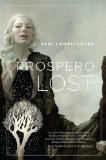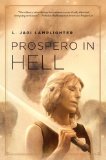
 Prospero Lost by L. Jagi Lamplighter
Prospero Lost by L. Jagi Lamplighter
Shakespeare didn’t give us the whole story of Prospero, Miranda, Ferdinand, Ariel, et al. If you want to find out what really happened to the characters from The Tempest, pick up L. Jagi Lamplighter’s Prospero Lost. It turns out that Miranda and Ferdinand didn’t get married, Ariel wasn’t freed, and Prospero didn’t get rid of his staff and books. Instead, Miranda found The Well at the World’s End and brought back the life-preserving water for her father and her siblings.
Now, centuries later, she runs Prospero Inc, a corporation that negotiates with many of Earth’s supernatural beings so they’ll stay content and won’t lash out at humans. If Prospero Inc wasn’t on the job, we’d have a lot more hurricanes, tsunamis, volcanic eruptions, and other “natural” disasters. You didn’t know about all this because it gets covered up by the Orbis Suleimani, the Circle of Solomon from which the Freemasons split off. This secret society has managed to keep most evidence of the supernatural out of our history books and to make us believe that most “legends” and “myths” are only fiction.
When we meet Miranda, she’s just found a note from her father which indicates that he’s in trouble, that The Shadowed Ones are trying to steal the Prosperos’ magical staffs, and that she must warn her siblings. You might expect that Miranda, a CEO who has assistants, a cell phone, and flies a Lear jet, could easily take care of this with a few phone calls, text messages, emails, or an announcement on the family blog, but if that were the case, the entire plot of Prospero Lost could have been condensed into 3 pages, so… no. Not knowing the whereabouts of any of her siblings, Miranda calls her servant Mab, the Aerie spirit who inhabits a body which looks and acts like Sam Spade. While they hunt down her family and dodge Hell’s minions, Miranda is forced to think about some heavy issues such as slavery, salvation, duty, insanity, loyalty, and faith.
I was attracted to Prospero Lost because of its gorgeous cover and because the description reminded me of Roger Zelazny’s Amber Chronicles (and Kage Baker said Amber fans should like it). While it’s true that both books contain an assortment of powerful and ambitious siblings who have lived for centuries and have abnormal concepts of familial bonds, the similarities end there. While the ideas in Prospero Lost are intriguing and Lamplighter’s writing style is pleasant enough, the story lacks the inventiveness and style that characterizes Zelazny’s work.
The first problem is that Miranda (the viewpoint character) is a prissy daddy’s girl. While I admire her loyalty, I think she’s boring. Other characters give her titles such as “Ice Queen” and “Maiden of Ice,” which tells you that she’s kind of hard to warm up to. Her brothers aren’t any better: Theo is dull and sluggish, Mephisto is insane and obnoxiously silly. Their sister Logistilla is better — she lives on a Caribbean island with animal servants who used to be her boyfriends.
The next problem is that the world-building is mostly done through flashback or dialogue, mostly as Mab interviews Miranda and a couple of her brothers. This is the way we learn about the Prosperos’ ancient connections with Peter the Great, Charlemagne, Napoleon, Louis XIV, the Loch Ness Monster, the Three Musketeers, Father Christmas, the tulip craze in Holland, the East India Company, a raid on the holy relics in the Vatican, etc. Through exposition Miranda explains how characters and creatures we thought of as myth or legend are real and that much that we consider mundane is really arcane. Some of these items are clever and fit well, but many seem thrown in (sometimes in list format) simply as an attempt to add weight to the world building. Unfortunately, they interrupt the action and make the plot feel slow and plodding. There are some exciting action scenes, several of which are amusing, and a couple of which are frightening, but there are also some that are just weird and never seem to settle into the plot very well. For this reason, Prospero Lost reminded me most of Matthew Sturges’s Midwinter — gorgeous cover art and lots of cobbled-together mythology masking a thin story and weak characters.
By the end of Prospero Lost, Miranda and Mab have a long list of questions without answers. Nothing has been resolved and we realize that we must read at least the next novel, Prospero in Hell, to get any sense of accomplishment. I have Prospero in Hell on my shelf, but I’m not sure that I’ll open it. I could have very easily left it alone if the most exciting part of Prospero Lost hadn’t occurred at the end of the very last sentence. Also, I’m a little curious to see where Lamplighter is going with this, especially since I suspect she has Christian allegory in mind.
Prospero’s Daughter — (2009-2011) Publisher: More than four hundred years after the events of Shakespeare’s The Tempest, the sorcerer Prospero, his daughter Miranda, and his other children have attained everlasting life. Miranda is the head of her family’s business, Prospero Inc., which secretly has used its magic for good around the world. One day, Miranda receives a warning from her father: “Beware of the Three Shadowed Ones.” When Miranda goes to her father for an explanation, he is nowhere to be found. Miranda sets out to find her father and reunite with her estranged siblings, each of which holds a staff of power and secrets about Miranda’s sometimes-foggy past. Her journey through the past, present and future will take her to Venice, Chicago, the Caribbean, Washington, D.C., and the North Pole. To aid her, Miranda brings along Mab, an aerie being who acts like a hard-boiled detective, and Mephistopheles, her mentally-unbalanced brother. Together, they must ward off the Shadowed Ones and other ancient demons who want Prospero’s power for their own…






Oh, I hate it when the first book is all set-up.
I really wanted to like this book.